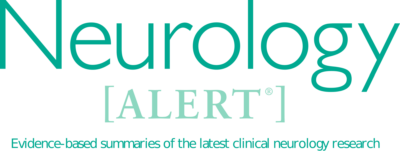
Neurology Alert – July 1, 2017
July 1, 2017
View Issues
-
Randomized Trial of Cannabidiol for Medically Refractory Seizures in Dravet Syndrome
In a double-blind study, 120 children and young adults with the Dravet syndrome and medically refractory seizures were assigned randomly to receive either cannabidiol or placebo, as well as their usual antiepileptic drugs/therapies. The primary finding was a significant decrease in convulsive seizure frequency during the 14-week treatment period for patients receiving cannabidiol compared to those receiving placebo.
-
Distinguishing the Neuropathy Associated with MGUS from POEMS
Nerve conduction and electromyography can help differentiate the neuropathy associated with monoclonal gammopathy of undetermined significance (MGUS) from polyneuropathy, organomegaly, endocrinopathy, M-protein, and skin changes (POEMS).
-
Omega-3 Polyunsaturated Fatty Acid Supplementation and Cognitive Decline
In a randomized, placebo-controlled trial of 1,680 participants aged 70 years or older, there was no significant difference in cognitive decline between any of the intervention groups taking omega-3 polyunsaturated fatty acid supplementation and/or multidomain intervention (physical activity, cognitive training, and nutritional advice) compared to the placebo group. However, exploratory post hoc analyses showed some promise for a protective effect with intervention in certain at-risk subgroups.
-
Migraine and the Blood-brain Barrier
During spontaneous attacks of migraine with visual aura, magnetic imaging studies indicate that the blood-brain barrier remains intact and the pons is activated.
-
Deep Brain Stimulation May Offer Hope in Treating Post-stroke Pain
This trial of deep brain stimulation of the ventral striatum/anterior limb of the internal capsule improved several measures of the affective sphere of pain in those suffering from post-stroke pain, despite no significant improvement seen in the pain disability index.
-
What Is the Risk of Hemorrhage During Pregnancy for a Woman with Brain Arteriovenous Malformation?
The risk of hemorrhage in a pregnant woman with a brain arteriovenous malformation (AVM) is uncertain and management is controversial.
-
Atypical Transient Symptoms Require Aggressive Investigation for Cause
Atypical transient symptoms, such as partial sensory deficit, dysarthria, vertigo and unsteadiness, unusual visual deficits, and diplopia, usually are not classified as transient ischemic attacks, and they frequently are not investigated in the same fashion. However, one-year risk of recurrent major vascular events was not significantly different between patients who had typical TIA symptoms or atypical isolated or non-isolated symptoms. Therefore, these patients should be investigated intensively in a manner similar to patients with classical TIA symptoms.
